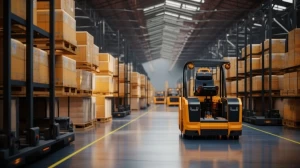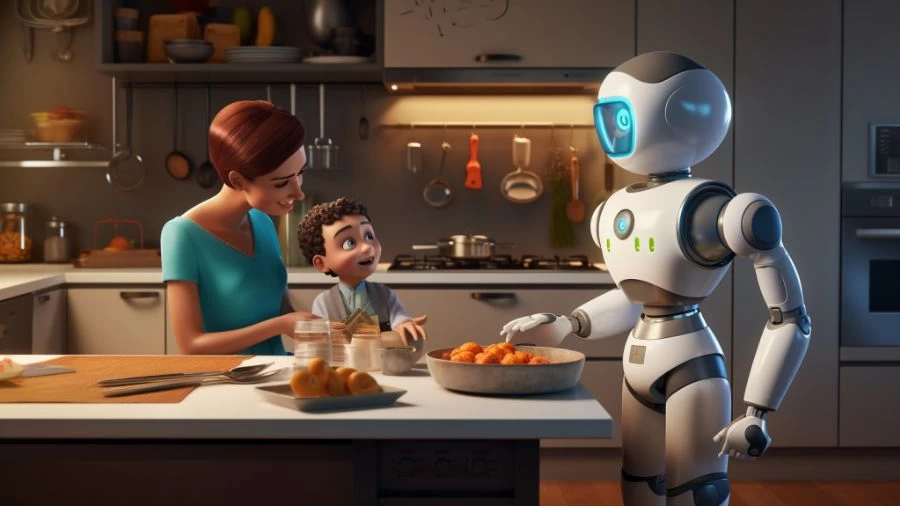
- Home »
- Technology »
- When Will Robots Do Your Chores? Are Humanoid Workers a Blessing or a Curse?
When Will Robots Do Your Chores? Are Humanoid Workers a Blessing or a Curse?
In the near future, robots could become valuable helpers in our households, taking on various chores to make our lives more convenient and the experts suggest that by 2033, these robots could manage around 39% of household tasks, potentially changing the way we live.
Published Sep 26, 2023 | Updated Sep 27, 2023 | 📖 7 min read
Who are Humanoid Workers?
Humanoid workers, generally refer to non-human entities or robots that have a physical form or characteristics resembling that of a human. These humanoid robots are designed to perform various tasks and functions, such as working as receptionists or providing general assistance to customers. They are built to mimic human movements and interactions to some extent.
Additionally, the term "humanoid" can also be used in fantasy settings to describe creatures like dwarves, elves, gnomes, and other human-like fantastical beings. So, in essence, humanoid workers are robotic or fantasy entities that have human-like appearances or qualities but are not actual humans.
When Will Robots Do Your Chores?
Experts predict that by 2033, robots will be able to handle around 39% of household chores, making our lives easier. Companies like Sanctuary AI are working on humanoid robots like Phoenix, which will understand our commands and perform various tasks. While there's no precise timeline for when these robots will become part of our households, it could happen within the next decade, thanks to advancements in artificial intelligence (AI).
Developing AI for robots that can perform useful tasks in the physical world is a complex challenge. Unlike text-based AI, humanoid robots need to interact with their surroundings, understanding how objects relate to each other. This involves solving intricate problems, like packing clothes into plastic bags. Currently, these robots are trained in virtual environments before attempting tasks in the physical world.
One significant challenge is providing these robots with a sense of touch, so they can handle objects with the right amount of pressure. Developing robots that can perform household chores is even more challenging and may take longer than mastering specific business-related tasks.
Humanoid robots still have a way to go before they can handle unstructured environments, like homes or busy workplaces, as effectively as humans. Humans have an intuitive understanding of context and consequences, which is challenging to replicate in robots.
While there is potential for humanoid robots to fill labor gaps in the future, there are also concerns about the impact on human jobs. As robots become more capable, some tasks traditionally done by humans may be automated. This transition could lead to growing pains but may also free up humans to focus on tasks that require uniquely human skills.
In summary, humanoid robots are advancing, and they may become part of our daily lives in the next decade, but there are still significant technical challenges to overcome, and the impact on the job market remains a topic of discussion and consideration.
Are Humanoid Workers a Blessing or a Curse?
The question of whether humanoid robots are a blessing or a curse is a complex one. These robots, like Sophia, are both fascinating and, to some, terrifying. The fear is that as technology advances, robots could become so advanced that they might pose a threat to humans. They could potentially be smarter, faster, and more efficient.
However, there's also a reassuring aspect to this. With the right laws and regulations in place, we can mitigate the risks and ensure that these advanced technologies are used responsibly and safely.
It's essential to remember that while artificial intelligence and robots can perform complex tasks, they are not necessarily here to replace people entirely. Instead, they can complement human abilities and make certain tasks more manageable and efficient.
So, the answer to whether we should be afraid or enlightened by these advancements depends on how we approach and regulate them. With the right precautions and ethical considerations, humanoid robots can be a valuable addition to our technological landscape, assisting us in various ways.
Will Robots Really Take Up Human Tasks in the Future?
The consensus among experts is that many professions may indeed become fully automated in the next five to 10 years. Here are some roles that are at risk of being taken over by AI in the near future:
Customer Service Representative: Customer service roles are becoming more automated, with chatbots and virtual assistants handling a broader range of customer inquiries, reducing the need for human workers in the customer service industry.
Car and Truck Driver: Advancements in autonomous vehicles are reducing the need for human drivers, impacting taxi and rideshare industries. Self-driving cars may soon become a common option, potentially affecting human drivers' jobs.
Computer Programmer: AI tools like ChatGPT can already be used to write code, which raises questions about whether entry-level programming jobs may succumb to automation.
Research Analyst: AI can perform research-centric tasks like processing data, detecting patterns, and organizing findings into visuals, making it ideal for delivering industry insights without human intervention.
Paralegal: AI's ability to process complex data, write legal reports, gather facts, sort documents, and conduct legal research may render certain administrative tasks performed by paralegals obsolete.
Factory or Warehouse Worker: AI powers machines in factories and warehouses, performing actions with greater speed and consistency than humans, reducing the dependence on human workers.
Financial Trader: AI can analyze markets, predict trends, and inform investment decisions faster and more accurately than humans, potentially leading to the disappearance of financial trader roles.
Travel Advisor: AI-powered travel platforms can provide personalized recommendations and travel tips, reducing the need for traditional travel agents.
Content Writer (In Some Cases): AI content generators can assist with repetitive content creation tasks, such as writing emails and social media posts. In some instances, AI can even produce first drafts for longer-form content.
Graphic Designer: AI-generated art and design tools are becoming more accessible, making it easier to create professional visuals without the need for graphic design services.
Which Jobs are Safe From AI?
There are several jobs that are less likely to be replaced by AI because they involve uniquely human skills and qualities. These jobs include:
Teacher: AI can assist in the classroom, but human teachers build trust, handle complex social interactions, and provide a level of intimacy and understanding that AI can't replicate.
Nurse: While AI can handle certain healthcare tasks, nurses provide essential bedside care, emotional support, and have the ability to address patients' fears and complex social interactions.
Social Worker: Social workers work with vulnerable populations, requiring a human touch, empathy, and judgment to understand unique circumstances and help individuals navigate challenging situations.
Therapist: Therapists offer emotional support and guidance, which involves deep emotional understanding and human connection that AI can't match, especially in addressing mental health crises.
Handyperson (Trades): Jobs in trades like plumbing and electrical work involve manual labor and complex human interactions, where AI's abilities fall short.
Lawyer: Lawyers rely on their moral and ethical judgment to provide legal advice, an area where AI's lack of human understanding raises ethical concerns.
HR Specialist: HR specialists deal with personalized, human interactions in areas like recruitment and employee relations, where AI may lack sensitivity and thoughtfulness.
Writer: Skilled human writers, whether in copywriting, UX writing, or technical writing, use critical thinking to tailor content to audience needs and preferences, which AI struggles to replicate.
Artist: While AI can generate art based on existing styles, human artists drive artistic innovation by creating new styles and ideas that are beyond the reach of AI-generated art.
We are still far from seeing AI fully automate manual labor positions. Occupations such as plumbing, construction, janitorial work, barbering, and most physically demanding jobs remain safe from AI for the time being.
What will Happen to Humans If Robots Take Over?
While it's true that robots can perform tasks more efficiently and consistently than humans, it's crucial to consider the broader consequences of this transition. One significant concern is the potential for job displacement. As robots assume more responsibilities, some jobs may become obsolete. This issue has sparked concerns among prominent figures.
Google's CEO, Sundar Pichai, has admitted that the idea worries him. Sam Altman, the creator of ChatGPT, has expressed some fear about the technology. Kevin Baragona, the founder of DeepAI, has likened the relationship between humans and AI to a "battle between chimps and humans." Stuart Russell, a leading AI pioneer, has even compared the recent AI surge to the discovery of an alien civilization.
When Will Robots Do Your Chores - FAQs
1. Will robots completely take over household chores?
While robots are becoming more capable, full automation of household chores may take several years to become widespread.
2. Can robots replace human cleaners and caregivers?
Robots can assist in cleaning and caregiving tasks, but human touch and decision-making are still essential in these roles.
3. Are there any chores that robots are already doing?
Yes, some robots can vacuum floors, mow lawns, and perform other specific tasks, but their capabilities are limited.
4. Will robots be affordable for everyday households?
As technology advances, the cost of robots may decrease, making them more accessible to the average household.
5. Are there concerns about privacy and security with household robots?
Yes, there are concerns about data privacy and security when using smart household robots, so it's essential to choose trusted brands and products.



